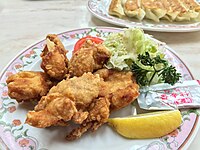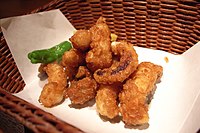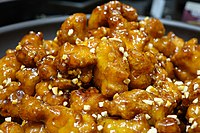Karaage

Karaage (唐揚げ, 空揚げ, or から揚げ, [kaɾaːɡe]) is a Japanese cooking technique in which various foods—most often chicken, but also other meat and fish—are deep fried in oil. The process involves lightly coating small pieces of the meat or fish with a combination of flour and potato starch or corn starch, and frying in a light oil. The foods are marinated prior to coating. The process differs from the preparation of tempura, which is not marinated and uses a batter for coating.[1] Karaage is often served alone or with rice and shredded cabbage.
When the main ingredient is coated with starch instead of flour, the dish may be called tatsuta-age (竜田揚げ).
History
The first references to a style of frying called karaage (then written as 空揚) were in the Genroku period at the end of the 17th century. Chicken karaage was popularized as a "Chinese-style" restaurant food (using the characters 唐揚) in the 1930s. There exists considerable disagreement among newspapers and publishers in Japan about the preferred kanji, leading some to write it phonetically as からあげ.
When used without a modifier, karaage usually refers to the chicken version of the dish; this has been the most common application of the cooking style since making karaage at home became more popular after World War II. The post-war increase in the popularity of karaage is said to have begun in Ōita Prefecture in neighboring cities Usa and Nakatsu. At the annual Karaage Festival in Nakatsu, over 60 different shops participate to provide unique versions of the dish.[2][3] Shops which advertise "Nakatsu karaage" can be found throughout Japan.[4][5]
In Japan, chicken karaage is commonly available in convenience stores such as Lawson, FamilyMart, and 7-Eleven as a fast-food item. It is also readily available in food stands throughout Japan.[6]
Karaage in the media
- Karaage has become embedded in Japanese cuisine and has made several TV appearances. Probably the most notable appearance has been in the anime/manga series Shokugeki no Souma, a show about a young aspiring chef who sticks to his roots in family restaurant food.[7]
- Another notable mention was by Anthony Bourdain. Bourdain sang praises for the Japanese fried dish in an interview, saying that he always stopped by Lawson to pick up karaage when he visited Japan.[8]
- The dish of the Japan Air Self-Defense Force is deep-fried chicken karaage,[9] such as Okinawan-style deep-fried chicken.[9] It has been used to promote the JASDF.[9]
Regional karaage
-
Chicken karaage at Gyoza no Ohsho
-
Gobō karaage
-
Octopus karaage
-
Squid tentacle karaage
-
"Bananafish" karaage
-
Dakgangjeong, a similar style of fried chicken consumed in Korea
Since karaage has spread throughout Japan, there have been many regional takes on the dish, the most notable ones including:[10]
- Zangi – Hokkaido prefecture's version of karaage, made with a marinade and served with a spicy dipping sauce.
- Tebasaki – Nagoya's version of karaage, made with bone in chicken wings, sprinkled with sesame seeds and basted with a special sauce.
- Chicken nanban – Miyazaki prefecture’s version of karaage, dipped in sweet vinegar and topped with tartar sauce.
- Gurukun no kara-age – Okinawa prefecture’s version of karaage. Gurukun is Okinawa's official and most popular fish, often called a "banana fish" in English; it is a fish fried whole and served with lemon.
- [Dakgangjeong] Error: {{Lang}}: text has italic markup (help)[11] – Korea's take on fried chicken, very similar to karaage, but usually made with milk and a sweet/spicy sauce consisting of soy sauce, rice wine, red chili pepper paste, honey, and seasonings.
- Fugu no kara-age – A version of karaage popular in Yamaguchi prefecture. Shimonoseki is known as the capital of fugu[12] and many restaurants serving fugu karaage can be found around the city. The flesh, organs, and bones of the blowfish are deep-fried.
See also
References
- ^ Judkis, Maura (26 November 2014). "Plate Lab: Karaage is like Japanese fried chicken". Washington Post.
- ^ "What's on | Oita, Japan | Tourism Information". www.discover-oita.com. Retrieved 2024-06-05.
- ^ "Karaage Festival" Retrieved June 5 2024
- ^ "【大分名物】中津からあげ7選!からあげの聖地で外せない名店はココ!" Retrieved June 5 2024
- ^ "【東京都内】こだわりのから揚げ専門店7選!大分・中津のご当地からあげも♪" Retrieved June 5 2024
- ^ Nomura, Mona (2017-02-21). "Japanese Convenience Stores Are Havens Of 24/7 Snacking". Eater. Retrieved 2019-05-31.
- ^ MKD TUBE 2.0 (2019-01-13), 食戟のソーマ Shokugeki no Soma [HD] WALK-N-EAT-KARAAGE || Best moments #6, retrieved 2019-05-31
{{citation}}: CS1 maint: numeric names: authors list (link) - ^ Joyce, Tabitha (13 June 2018). "Anthony Bourdain's favourite foodie finds". CN Traveller. Retrieved 2019-05-31.
- ^ a b c "ASDF hopes its fried chicken can outgun popular curry of MSDF". Asahi. November 3, 2020. Archived from the original on April 7, 2021.
- ^ "Chickened Out: Kara-age, Tatsuta-age, and More - Special Features - Japanese Food". NHK WORLD. Retrieved 2019-05-31.
- ^ "Dakgangjeong (Sweet Crispy Korean Fried Chicken)". Korean Bapsang. 2014-03-17. Retrieved 2019-05-31.
- ^ "Shimonoseki Guide". Japan Experience. 2012-12-27. Retrieved 2022-03-08.
External links
- Japan Karaage Association (in Japanese)
- Karaage JP (in Japanese)
- Photos and further info about karaage (in English)
- Chicken Karaage recipe video (in English)






